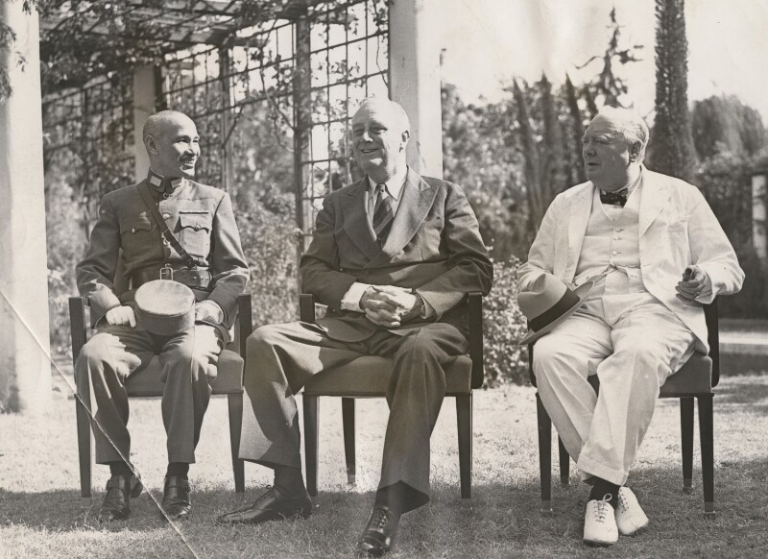
The Cairo Declaration, which outlined the Allies’ goals for post-war Asia, including the independence of Korea and the return of territories to China, was a significant step toward a more just and stable world
New York, N.Y. The Cairo Conference of 1943 was a a pivotal moment in world history. This conference brought together three remarkable leaders: Chiang Kai-shek, Franklin D. Roosevelt, and Winston Churchill. Their collaboration and strategic vision during World War II not only shaped the outcome of the war but also set the stage for a new global order. These thought leaders and global citizens exemplified the power of unity and diplomacy in the face of unprecedented challenges.
The Cairo Conference, held from November 22 to 26, 1943, was a crucial meeting where the Allied leaders discussed the post-war reorganization of Asia and the defeat of Japan. Each leader brought a unique perspective and set of priorities to the table, yet their shared commitment to peace and stability allowed them to forge a path forward together.
Chiang Kai-shek, as the leader of the Republic of China, played a vital role in the discussions.
Born in 1887 Chiang was 56 at this time. Chiang was a staunch nationalist dedicated to the sovereignty and modernization of China. His leadership during the Second Sino-Japanese War demonstrated his resilience and strategic acumen. At the Cairo Conference, Chiang’s presence underscored the importance of China’s role in the Allied efforts and highlighted the necessity of addressing Asian geopolitical dynamics in the post-war world.
Franklin D. Roosevelt, born in 1882, FDR was now 61, just a year and a half before he died in April 1945.
He served as the 32nd President of the United States. His leadership during the Great Depression and World War II showcased his ability to navigate complex crises with a vision for a better future. Roosevelt’s New Deal policies and his steadfast commitment to democracy and human rights resonated globally. At Cairo, Roosevelt’s diplomatic skills and inclusive approach helped bridge differences and foster a cooperative spirit among the Allies.
Winston Churchill, born in 1874, 69 was the Prime Minister of the United Kingdom.
He resigned just a few months after FDR passed, in July 1945. Known for his indomitable spirit and eloquence, Churchill was a symbol of resistance against tyranny. His speeches and writings galvanized not only the British people but also the entire free world. At the Cairo Conference, Churchill’s strategic insight and historical perspective were invaluable in shaping the discussions and decisions that would impact the global order.
The Cairo Conference was more than just a strategic meeting; it was a testament to the power of collaboration and shared vision. The leaders’ agreement on the Cairo Declaration, which outlined the Allies’ goals for post-war Asia, including the independence of Korea and the return of territories to China, was a significant step toward a more just and stable world. This declaration affirmed the Allies’ commitment to self-determination and sovereignty, principles that would shape the post-war international landscape.
As we reflect on the Cairo Conference, we recognize the profound impact these leaders had on shaping the course of history. Their ability to put aside differences and work toward common goals serves as an enduring example of effective leadership and diplomacy. Chiang Kai-shek, Franklin D. Roosevelt, and Winston Churchill demonstrated that even in the most challenging times, it is possible to forge alliances and create pathways to peace and progress.
Today, as we face new global challenges, the lessons from the Cairo Conference remain relevant. The values of unity, resilience, and strategic vision are as critical now as they were then. We are reminded of the importance of international cooperation and the need for leaders who can inspire and guide us through uncertain times.
The Cairo Conference also highlights the delicate balance between national interests and global responsibilities. Chiang, Roosevelt, and Churchill managed to advocate for their respective nations while also recognizing the broader implications of their decisions. This balance is essential for addressing today’s complex global issues, from climate change to economic inequality.
In honoring these leaders, we celebrate their legacy of courage, wisdom, and collaboration. Chiang Kai-shek, Franklin D. Roosevelt, and Winston Churchill showed us that true leadership is about more than power; it is about vision, integrity, and the willingness to work together for the greater good. Their contributions at the Cairo Conference continue to inspire us to strive for a world where peace, justice, and cooperation prevail.
Chiang Kai-shek, Roosevelt, Churchill: Architects of New World Order (July 21, 2014)
#CairoConference #ChiangKaiShek #FDR #WinstonChurchill #WorldWarII #GlobalLeadership
TAGS: Cairo Conference, Chiang Kai-shek, Franklin D. Roosevelt, Winston Churchill, World War II, diplomacy, global leadership, international cooperation